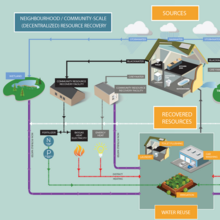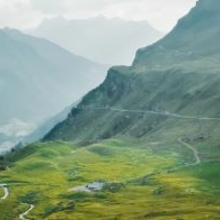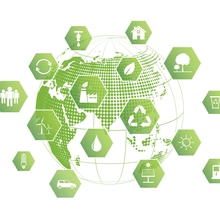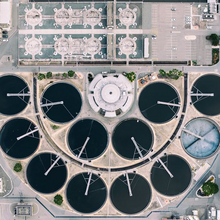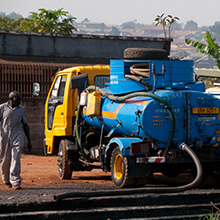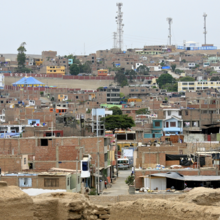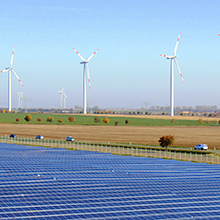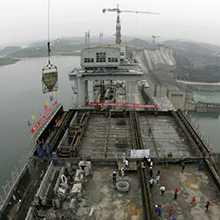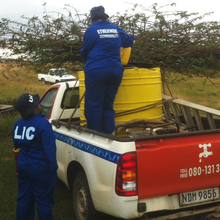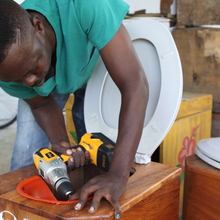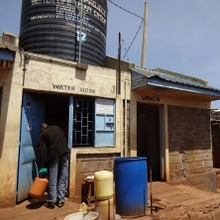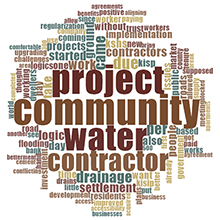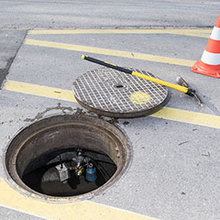Department Environmental Social Sciences
Cirus – Sustainability Transitions & Innovation Studies

Our research contributes to a better understanding of how and where radically novel, more sustainable technologies, products and services develop, how they diffuse in space, and how they may support sustainability transitions in locked-in sectors like energy, water, mobility, construction, or chemicals.
Cirus explores how transformative technologies, such as renewable energies, decentralized water reuse, net-zero construction, low-carbon mobility or animal-free chemicals testing develop, diffuse, and turn into global standards. Our research at the interface of innovation studies, economic geography, and institutional sociology develops state of the art theories and methodologies for understanding how socio-technical systems shift toward more sustainable development trajectories and how these shifts may be supported by firms, policy makers and civil society. A focal interest of our work is exploring the geographies of innovation and transition processes.
Our take on sustainability transitions and innovation dynamics
Cirus’ theoretical home is socio-technical systems thinking. In this perspective, innovation and sectoral transitions depend on shifts in interdependent technological and social structures, instead of mere technological changes. The core assumption is that novel technologies only function properly if they are embedded in fitting institutional structures (e.g. regulations, value concerns, routines) and that social structures in turn shape the direction of technological change. Transitions and 'green' innovation dynamics are therefore not limited to the “adoption” of new, more sustainable products in existing markets, but require the active alignment of technologies with user practices, business models, laws, and complementary infrastructures. These alignments typically get established in long-term processes and require actors to strategically construct supportive 'innovation system' structures.
Our research agenda accordingly revolves around three conceptual building blocks. First, it aims at understanding innovation processes in newly emerging ‘green’ industries from an innovation system perspective. Second, it focuses on exploring the institutional dynamics and value shifts that accompany the creation of radically new solutions for addressing complex environmental challenges. And third, most of our work tackles innovation and transitions dynamics from a spatial perspective. It explores in depth how transitions are embedded in specific places, why they happen in some regions and not others and how multi-scalar linkages influence their dynamics.
Innovation and industrial dynamics in ‘green’ sectors
A key vantage point of our research focuses on technological innovation happening in newly emerging industries like decentralized water reuse, renewable energies, or environmentally benign chemicals. Typically, innovation dynamics in these ‘new-to-the-world' industries are not depending on firm-internal R&D alone, but rather on distributed networks with research institutes, governmental actors, financial investors and civil society. As such, our conceptual contributions in this field build strongly on innovation system theories. This approach allows us to analyze how firms interact with a systemic environment that supports them in mobilizing financial investment, constructing niche markets, or legitimizing radically novel solutions with decision makers and end users.
The innovation system lens allows us to explain how actors with complementary expertise need to team up for successfully launching new products and services, how they can strategically mobilize system resources needed to establish new clean tech industries and how they can jointly tackle systemic barriers that limit their development potential. A core question in our research agenda concerns how innovation system structures can be strategically built up. Other questions include: How and where do innovation activities in green sectors emerge, how do actors create joint strategies to overcome development barriers and at what places and scales do innovation system structures form in newly emerging industries?
More specific research questions focus on how the system resources needed for developing ‘green’ industrial paths can be mobilized both locally and through multi-scalar networks, how firms in peripheral regions can draw on resources developed elsewhere when developing green industrial paths or how transformative innovation moves from early niche applications to challenging taken-for-granted sectoral structures. A key question also revolves around understanding how supportive innovation system structures differ between industry types. Should e.g. policy strategies to support water reuse solutions differ from policies supporting low-carbon urban mobility?
Institutional dynamics and value shifts toward sustainability
A second major research theme of Cirus is exploring how institutional structures condition innovation processes, how they impact new technologies’ success or failure, as well as their development direction. By institutions we denote all those regulative, normative and cognitive rules that actors accept as relevant for selecting and/or justifying their actions. Institutions are a core explanatory factor for the success or failure of innovation processes and for understanding the legitimation or refutation of new solutions by users, regulators or society at large.
One of the core characteristics of institutional structures is that they are based on conventions among members of a society. This means that they must be constantly reproduced and sanctioned to serve as binding orientations for all actors. Due to this mutual reinforcement, institutions are in general very hard to change and may represent high barriers for socio-technical transitions. However, institutions may also be the target of strategic interventions by actors that aim at changing the rules of the game in a way that serves their own interests better.
Specific research questions relate to how institutional structures shape the course of transitions in specific sectors like energy, urban water, chemicals, construction or transport. We analyze, more specifically, how legitimacy of new technologies is created, how early markets for radically new products are constructed, and how different actors can jointly change hindering institutional structures. We also investigate how visions and expectations of innovating actors shape the course of emerging technologies and analyze how specific portfolios of institutional structures provide advantages to particular regions trying to gain a head start as hosts of new industries.
Most recently, our focus has shifted to analyzing how processes of “valuation” impact the development of new technologies. By valuation we denote the specific institutional structures and processes by which technologies, products or services get associated with specific moral values. Valuation is often enacted through so-called “valuation devices”, i.e. procedures that assess and communicate whether a specific product is congruent with a given set of values. An example for Cirus’ work is ecolabels for hydropower generated electricity in Switzerland or quality standards for wastewater treatment plants in Bangalore. By analyzing the construction principles of such valuation devices, we may anticipate future.
The geographies of transitions in a globalized world
A third overarching research theme focuses on the analysis of how trans-local or trans-national processes shape transitions. While conventional transition research tends to examine sectoral transformations mostly within particular regions (e.g., the Netherlands) and at given geographical scales (e.g., cities or nations), our research agenda explores how transitions depend on complex interactions across multiple locations and spatial scales. Our work on the geographies of sustainability transitions (GeoST) shows that the geographic dimension is not just another context condition, but a key explanatory factor in understanding how transitions come about, how relevant innovation processes are spread across the world and how and where structural change can be actively influenced by policy makers, firms and civil society.
We focus on two key questions. First, we examine the relevant structures and dynamics at different spatial scales that impede the emergence and adoption of transformative innovations. For example, our work on ‘global socio-technical regimes’, shows that unsustainable socio-technical configurations often get institutionalized at a global scale. Global regime configurations like centralized water infrastructures, car-centric urban mobility or fossil energy tend to diffuse widely in space, inhibiting the adoption of more sustainable, locally adapted solutions. Understanding the mechanisms through which global regimes impede the diffusion of more sustainable solutions and how innovative regions can shield themselves from global regimes is a key question for academia and policymaking.
Second, we explore the multi-scalar structures and dynamics that enable transformative change. Our work on ‘global innovation systems’ explores in depth how innovation processes in emerging clean tech industries such as solar energy, decentralized water reuse or low-carbon mobility benefit from interrelationships between different regions, countries, and international arenas. Particular contributions of our past research have been on providing a better understanding of how peripheral regions may develop into global leaders (electric vehicle batteries in China), how seemingly deprived regions can act as hotbeds for the development of radically new technologies (water reuse in Bengaluru), and what it would take for currently leading industrial regions to keep their position when their core technologies start to shift radically (electric vehicles in car manufacturing regions of Germany).
Methods
We employ a broad range of qualitative and semi-quantitative methods, with a strong expertise in conducting in-depth case studies using literature analysis, semi-structured expert interviews and qualitative content analysis. More recently, we have pioneered and are further refining a novel methodological approach to identify and measure shifts in socio-technical configurations over time and space. This approach named socio-technical configuration analysis (STCA) is part of the family of social network analysis methods but focuses on semantic networks instead of actor collaboration networks. While STCA enables the retracing of socio-technical system dynamics, we typically combine it with more explanatory methods like expert interviews, qualitative case studies, process tracing or qualitative comparative analysis (QCA). For more information on this method, please visit our online STCA guidebook.
Our main methods:
- In-depth case studies
- Expert interviews
- Literature analysis
- Qualitative content analysis
- Socio-technical configuration analysis (STCA)
- Quantitative text analysis
Impact
The conceptual anchoring of Cirus’ research in innovation studies and economic geography provides a strong foundation for strategic consultancy for a broad range of actors dealing with ‘green’ innovation and transition phenomena. Cirus has accumulated strong expertise in advising strategic planning processes, technology roadmapping, regional infrastructure planning, innovation strategies of individual organizations (companies, NGOs, government offices, research organizations, etc.) or setting up intermediary structures fostering complex innovation processes (e.g. for the development of an ecolabel electricity from renewable resources).
Impact oriented methodologies
Specific impact-oriented methods encompass the conception and implementation of participatory foresight and scenario planning, developing multi-actor valuation devices, roadmapping for emerging technology fields and modelling of transition trajectories.
Real-World Labs
A very noteworthy recent initiative of Cirus researchers jointly with colleagues from other Eawag departments has been the set-up of a real-world research platform in Bangalore, India (the WaterReuseLab). This project operates as a collaboration platform for local actors developing innovative decentralized water reuse solutions. Cirus has initiated the platform and supports it through research projects that apply a systemic perspective on the key barriers to creating high-quality and scalable water reuse solutions. The platform is open to other research groups interested in conducting research in this highly dynamic urban context.
Management of national and global innovation networks
Beyond urban living labs, we also engage in the management of local, regional, national and even global actor networks aiming for sustainability transitions in specific sectors.
- Over the last years, we have initiated a global innovation network developing innovative urban water reuse solutions jointly with UC Berkeley, Eawag and BlueTech Research. The network combines leading technology companies, researchers and city officials from ‘lighthouse cities’ experimenting with transformative water reuse solutions like San Francisco, New York, Hamburg, Helsingborg, Bangalore and Sydney (see our white paper).
- At the national level, we have recently finalized a roadmapping process for the implementation of decentralized water management concepts across Switzerland resulting in a position paper for actors from the Swiss confederation, cantonal administrations, professional associations, utilities and consultancies.
- At the regional level, we supported strategic infrastructure planning processes in several catchment areas of wastewater treatment plants in Switzerland formulating a general methodology for infrastructure foresight.
- At a city level, we conducted research on new approaches to urban planning especially for countries in the Global South that struggle with upgrading rapidly growing informal settlements. We proposed new inroads to effectively leverage participation processes and to better understand barriers to the successful implementation of national and international infrastructure upgrading strategies (see our project SUSIS). Our results informed the national Kenian upgrading program KISIP in the development of its second major program phase. In another project we focused on how success of sanitation innovations in informal settlements may depend on joint activities by local policy makers, utilities, community-based organizations, but also international NGOs and donors (see our project SuSARA).
Academic community services
Besides supporting real-world innovation and investment strategies, we are very proactive in providing high-level academic community services. B. Truffer acts as the Editor in chief of the core journal of transition studies network (Environmental Innovation and Societal Transitions). C. Binz leads the “geography of transitions” thematic group of the Sustainability Transitions Research Network). Finally, we have been selected to host the yearly International Sustainability Transitions Network conference in Zürich in 2026.
Team
Group Leaders
Scientists / PostDocs
PhD Students
Research assistants & guests
Teaching
Bernhard Truffer lectures regularly in several courses at Utrecht University at the innovation studies section (methods and transitions in the global south) courses, and the economics and geography department (capita selecta of leading scholars).
Furthermore, he regularly supervises master students at Utrecht University.
Christian Binz is the main lecturer in a master's seminar at the University of Zurich: Geography of Sustainability Transitions.
He also acts as a guest lecturer in a master course at Lund University: Globalization and Innovation.
In addition, he has been actively involved as a guest lecturer in courses at the University of Bern, Florence, EPFL, and the University of Neuchatel.
He also regularly supervises master students at the University of Zurich and Lund University.
Johan Miörner is an associate senior lecturer at Lund University with extensive teaching experience at all levels. At the Department of Human Geography he coordinates and is the main teacher on three courses: Economic Geography (7,5 ECTS), Human Geography: Bachelor Thesis (15 ECTS) and Human Geography: Bachelor Thesis in Urban and Regional Planning (15 ECTS). At the Department of Service Studies, he coordinates and teaches one course: Economic Geography of the Service Sector (7,5 ECTS).
He is also a guest lecturer in courses at the National PhD Program in Human Geography: Economic Geography (7,5 ECTS) and Future Geographies (7,5 ECTS).
In addition, he continuously supervising bachelor- and master students in Human and Economic Geography and Economic History.
Till Beer supports Christian Binz in the master's seminar at the University of Zurich: Geography of Sustainability Transitions.
Djamila Lesch supports Christian Binz in the master’s seminar at the University of Zurich: Geography of Sustainability Transitions.
Furthermore, she has been engaged in mentoring tasks for a bachelor’s seminar at the University of Zurich.
Meike Löhr has been teaching several courses on energy transitions for social scientists at the University of Oldenburg.
She also supervises theses in social sciences and transition studies at the University of Oldenburg and University of Zurich.
Publications
See a list of all ESS publications













